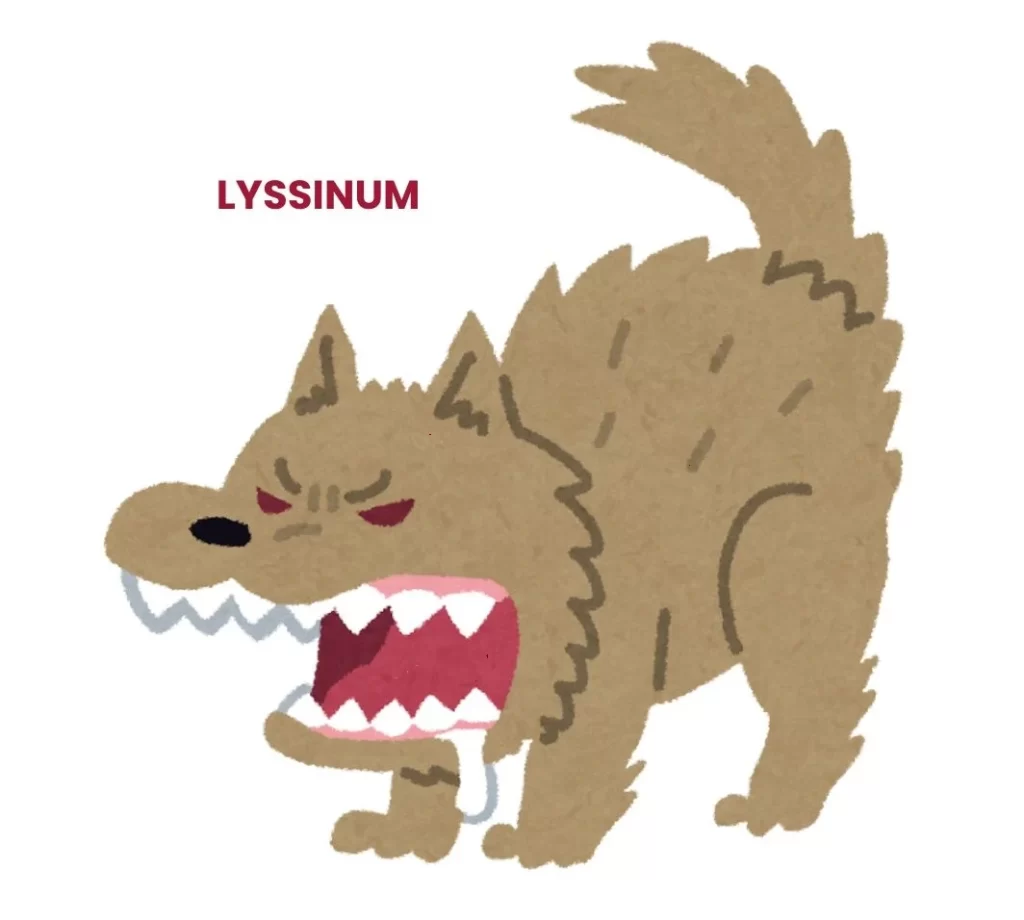Lyssinum, also known as Hydrophobinum, is a homeopathic remedy prepared from the saliva of a rabid dog.
It primarily affects the nervous system and is used to treat symptoms related to abnormal sexual desire, convulsions, and hypersensitivity of the senses.

SOURCE INFORMATION
Scientific Classification
- Kingdom: Animalia
- Phylum: Chordata
- Class: Mammalia
- Order: Carnivora
- Family: Canidae
- Genus: Canis
- Species: Canis lupus familiaris
Historical Facts
- Origin: Derived from the saliva of a rabid dog, traditionally used to treat symptoms of rabies and related nervous system disorders.
- Homeopathic Use: Introduced into homeopathy for its specific action on the nervous system, addressing symptoms such as convulsions, hypersensitivity, and abnormal sexual desires.
DRUG PATHOGENESIS
- Primary Action: Lyssinum primarily affects the nervous system, causing symptoms like convulsions, hypersensitivity, and emotional disturbances.
- Secondary Action: It also impacts the digestive and respiratory systems, causing symptoms like sore throat, difficulty swallowing, and altered voice.
KEY CHARACTERISTICS
- Nervous System: Affects the nervous system, causing convulsions, hypersensitivity of senses, and emotional disturbances.
- Sexual Desire: Abnormal sexual desire, lascivious behavior, and related complaints.
PARTICULAR ORGAN SYMPTOMS
HEAD
- Lyssophobia: Fear of becoming mad.
- Hypersensitivity: Heightened sensitivity of all senses.
- Chronic Headache: Persistent headache with boring pain in the forehead.
- Emotion and Bad News: Aggravates symptoms.
MOUTH
- Constant Spitting: Produces tough, viscid saliva.
- Sore Throat: Persistent desire to swallow, which is difficult.
- Frothing at Mouth: Produces frothy saliva.
MALE
- Lascivious: Increased sexual desire and priapism.
- Frequent Emissions: Without emission during coition.
- Atrophy of Testicles: Reduction in size of testicles.
FEMALE
- Uterine Sensitiveness: Conscious awareness of the womb.
- Prolapsed Womb: Sensation of prolapsed uterus.
- Vagina Sensitive: Painful coition due to vaginal sensitivity.
- Uterine Displacements: Issues related to displacement of the uterus.
RESPIRATORY
- Altered Voice: Change in the tone of the voice.
- Spasmodic Contraction: Contraction of respiratory muscles causing breathing issues.
STOOL
- Desire for Stool: Triggered by seeing or hearing running water.
- Watery Stools: Profuse and watery, often with abdominal pain.
- Urination: Constant desire to urinate when seeing running water.
MODALITIES
- Worse from: Sight or sound of running water, thinking of fluids, dazzling or reflected light, heat of sun, stooping.
- Better from: The specifics of what improves the symptoms are not detailed in the provided text.
RELATIONSHIP WITH OTHER DRUGS
Compare with
- Xanthium spinosum (Cockle): Used for hydrophobia and chronic cystitis in women.
- Cantharis: Known for treating severe burns and urinary tract infections.
- Belladonna: Used for conditions with sudden onset and high fever.
- Stramonium: Used for violent delirium and fear of water.
- Lachesis: Effective for circulatory disorders and throat infections.
- Natrum muriaticum: Known for its use in emotional disorders and headaches.
DOSE
- Potency: Typically used in the thirtieth potency (30C).
- Dosage: The exact dosage and frequency should be determined by a homeopathic practitioner based on individual symptoms and response to treatment.
Frequently Asked Questions
What are the main indications for Lyssinum?
- Lyssinum is primarily indicated for nervous system disorders, abnormal sexual desire, hypersensitivity of senses, and convulsions.
How should Lyssinum be taken?
- It is usually taken in the thirtieth potency (30C). The exact dosage should be determined by a homeopathic practitioner.
Are there any side effects of using Lyssinum?
- In homeopathic doses, side effects are rare.
- However, if symptoms worsen or new symptoms appear, it is advisable to consult with a homeopathic practitioner.
Can Lyssinum be used alongside conventional medications?
- Yes, but it is important to inform your healthcare provider and homeopathic practitioner about all the medications and treatments you are currently using to avoid potential interactions.
What should I do if I experience worsening symptoms?
- If symptoms worsen, contact a homeopathic practitioner or healthcare provider to reassess the treatment plan.
What does “lyssophobia” mean?
- Lyssophobia refers to the fear of becoming mad or rabid, often associated with rabies.
What is “priapism”?
- Priapism is a condition characterized by persistent and painful erections.
Lyssinum is a versatile homeopathic remedy addressing a range of symptoms, particularly those related to the nervous system, sexual desire, and hypersensitivity of senses.
Always consult with a qualified homeopathic practitioner for personalized treatment and dosage.
